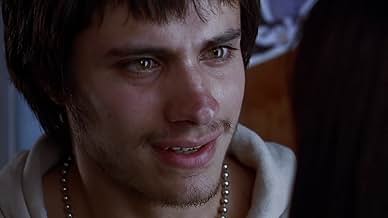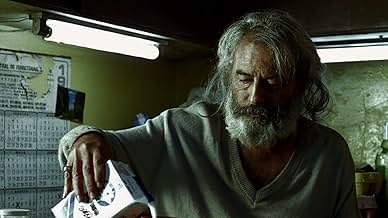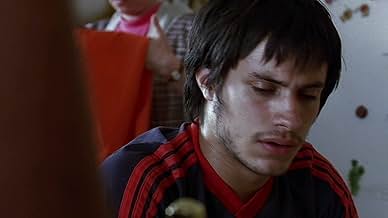Ein schrecklicher Autounfall verbindet drei Geschichten miteinander. In jeder von ihnen haben sich die Figuren mit Verlust, Reue und den harten Realitäten des Lebens auseinanderzusetzen, und... Alles lesenEin schrecklicher Autounfall verbindet drei Geschichten miteinander. In jeder von ihnen haben sich die Figuren mit Verlust, Reue und den harten Realitäten des Lebens auseinanderzusetzen, und alles im Namen der Liebe.Ein schrecklicher Autounfall verbindet drei Geschichten miteinander. In jeder von ihnen haben sich die Figuren mit Verlust, Reue und den harten Realitäten des Lebens auseinanderzusetzen, und alles im Namen der Liebe.
- Regie
- Drehbuch
- Hauptbesetzung
- Für 1 Oscar nominiert
- 55 Gewinne & 24 Nominierungen insgesamt
Gael García Bernal
- Octavio
- (as Gael García)
Álvaro Guerrero
- Daniel
- (as Alvaro Guerrero)
Empfohlene Bewertungen
Maybe for most of you, people outside third-world countries like Mexico or Colombia, my home, movies like ths one are only representations of another world... something away from you. My city, medellin, is one of the most dangerous cities on the world. Mexico city can be as dangerous as medellin. I`m not talking about politics. maybe you haven`t lived violence as near as i have, but im gonna tell you something, that is the main reason i voted 9 this movie: Amores perros is not fiction. Its a perfect peep to what life is here. We have expensive models that go to stupid tv shows, we have dog fighting, we have mercedes, we have old trucks, we have killers, businessmen, we feel love, we have houses... our life, as you can see in the movie, isn`t as different as you think. Amores perros can show you that life is not easy here. but that`s it. What you saw is thousand`s of people life. that`s why it`s so magic to you. Yourè seeing what you will never live there, in london, new york, seattle, paris, berlin... reality is weirder than fiction... see it on amores perros, and you`ll believe me... live it here, and no movie will surprise you
There is a character in 'Amores perros' who looks like Karl Marx. He is a tramp and an assassin, a good bourgeois who one day, Reggie Perrin-like, abandoned his family, and, un-Reggie Perrin-like, joined the Sandanistas in an effort to create a better world, earning 20 years in prison for his troubles. Walking the streets with a creaky cart and a gaggle of mangy dogs, he was found by the policeman who jailed him, who gave him a dingy place to live, food, and the odd, non-official contract.
El Chivo is the soul of the film, the missing link, both in appearance (a man called 'The Goat', who has rejected the civilities of society and lives a beast-like existence with his dogs, amongst the ruins of civilisation), and narrative function. With intricate structure, 'Amores perros' tells three stories, one of underclass Mexican life, where survival depends on what New Labour calls 'illegal economies' (dog-fighting, bank-robbing etc.), where bright young women are stifled and degraded by thoughtless pregnancies and brutal marriages, where single mothers depend (and usually can't depend) on shiftless sons for subsistence; and this world's mirror opposite, the world of the media, of celebrity, of models and magazine editors, of daytime TV, perfume advertising campaigns and bright apartments. Family life is central here too, although in this case it is torn apart by more pleasanntly bourgeois ailments like ennui and dissatisfaction.
These two stories are mediated by the narrative of El Chivo, the man who left one of these worlds for the other, but who still negotiates the two, through his search for the daughter he left as a toddler, and in his 'job', wiping out businessman. If Mexico is emerging as part of the super-confident globalism of high-capitalism, than El Chivo is the grizzly sore thumb, the ex-Sandinista, the Marx lookalike, the man who said no, the drop-out, the forgotten, the depleted spirit of the Left, happily killing and torturing the servants of the new economic regime.
There is something Biblical about his hirsute ascetism too, presuming to judge the 'Cain and Abel' half-brothers, one an adulterer, the other with a contract out on his sibling, another example of family gone badly wrong. This, the bleak funeral and grave scenes, and Octavia's functional crossing himself every time he passes an icon on the landing, are the sole residual elements of religion in a society once ostentatiously religious.
Except for the director. Like Paul Thomas Anderson in 'Magnolia', although to a less self-conscious degree, Gonzales Inarritu is the God of his film, intricately creating the structure that links his characters and their different environments. These are negative connections, however, which work against the idea of coherent meaning in life - contact usually results in destruction (physical, material, spiritual), or diminishing.
He is also an Old Testament god, punishing those who would get too confident with their future plans or their seemingly inviolable present success - the gains of capitalism are prey to the violent whims of chance: Gonzalez Inarritu doesn't need frogs to shake a rigid society or mindset.
Moral change is linked to physical change - being beaten up, losing a leg, cutting hair. The punning title, with its reference to the dog-eat/fight-dog nature of modern life, and its general unsatisfactoriness, also gives the film its Biblical feel, the idea of Mexico as an asphalt desert, or a rubbish heap, with all these scrawny mutts scavenging the remains.
'Amores perros' shares the sickly, bleached near-monochrome look of many recent crime films, like 'Chopper' or 'Bleeder'. But where the heightened mise-en-scene in those works were expressionistic projections of their protagonists' psychosis, here it's part of a controlling world-view, the universal consciousness that creates, connects and destroys.
The three stories, though connected narratively and symbolically, are mutually distinct - the first is an exhilirating mix of violent gangster film and frustrated romance; the second is like a short story (the screenwriter is a novelist), a figurative plot where movement is through image, symbol and idea, rather than film narrative; the third is a kind of spiritual journey, with an appropriately Biblical (or Wim Wenders-like) openness.
'Amores perros' is not quite as amazing as its admirers claim - it says more about contemporary cinema that a film only has to hold your interest for it to be a masterpiece - but it is consistently enthralling, and, despite all the stylistic tics and brutal violence, bracingly humanist.
El Chivo is the soul of the film, the missing link, both in appearance (a man called 'The Goat', who has rejected the civilities of society and lives a beast-like existence with his dogs, amongst the ruins of civilisation), and narrative function. With intricate structure, 'Amores perros' tells three stories, one of underclass Mexican life, where survival depends on what New Labour calls 'illegal economies' (dog-fighting, bank-robbing etc.), where bright young women are stifled and degraded by thoughtless pregnancies and brutal marriages, where single mothers depend (and usually can't depend) on shiftless sons for subsistence; and this world's mirror opposite, the world of the media, of celebrity, of models and magazine editors, of daytime TV, perfume advertising campaigns and bright apartments. Family life is central here too, although in this case it is torn apart by more pleasanntly bourgeois ailments like ennui and dissatisfaction.
These two stories are mediated by the narrative of El Chivo, the man who left one of these worlds for the other, but who still negotiates the two, through his search for the daughter he left as a toddler, and in his 'job', wiping out businessman. If Mexico is emerging as part of the super-confident globalism of high-capitalism, than El Chivo is the grizzly sore thumb, the ex-Sandinista, the Marx lookalike, the man who said no, the drop-out, the forgotten, the depleted spirit of the Left, happily killing and torturing the servants of the new economic regime.
There is something Biblical about his hirsute ascetism too, presuming to judge the 'Cain and Abel' half-brothers, one an adulterer, the other with a contract out on his sibling, another example of family gone badly wrong. This, the bleak funeral and grave scenes, and Octavia's functional crossing himself every time he passes an icon on the landing, are the sole residual elements of religion in a society once ostentatiously religious.
Except for the director. Like Paul Thomas Anderson in 'Magnolia', although to a less self-conscious degree, Gonzales Inarritu is the God of his film, intricately creating the structure that links his characters and their different environments. These are negative connections, however, which work against the idea of coherent meaning in life - contact usually results in destruction (physical, material, spiritual), or diminishing.
He is also an Old Testament god, punishing those who would get too confident with their future plans or their seemingly inviolable present success - the gains of capitalism are prey to the violent whims of chance: Gonzalez Inarritu doesn't need frogs to shake a rigid society or mindset.
Moral change is linked to physical change - being beaten up, losing a leg, cutting hair. The punning title, with its reference to the dog-eat/fight-dog nature of modern life, and its general unsatisfactoriness, also gives the film its Biblical feel, the idea of Mexico as an asphalt desert, or a rubbish heap, with all these scrawny mutts scavenging the remains.
'Amores perros' shares the sickly, bleached near-monochrome look of many recent crime films, like 'Chopper' or 'Bleeder'. But where the heightened mise-en-scene in those works were expressionistic projections of their protagonists' psychosis, here it's part of a controlling world-view, the universal consciousness that creates, connects and destroys.
The three stories, though connected narratively and symbolically, are mutually distinct - the first is an exhilirating mix of violent gangster film and frustrated romance; the second is like a short story (the screenwriter is a novelist), a figurative plot where movement is through image, symbol and idea, rather than film narrative; the third is a kind of spiritual journey, with an appropriately Biblical (or Wim Wenders-like) openness.
'Amores perros' is not quite as amazing as its admirers claim - it says more about contemporary cinema that a film only has to hold your interest for it to be a masterpiece - but it is consistently enthralling, and, despite all the stylistic tics and brutal violence, bracingly humanist.
Nothing in this film happens for no other reasons than bad decisions taken from the depth of the most negative emotions of our species. It's a portrait of how brilliant we are at just doing harm to ourselves while also having an impact on the lives of the people around us. A very good film, with good storytelling, good acting, good photography and good musics, which is a tribute to human unease.
Three stories of life in Mexico, all loosely linked by one core element, dogs.
What a powerful and shocking movie this is, Amores perros is one of those films that truly lives with you.
I can't admit to seeing a huge amount of Mexican films, but I've certainly seen Mexico, Mexico City in particular as the setting for many crime documentaries, it is clearly one busy, but very dangerous City.
Intensely thought provoking and engrossing in equal measure, this film hits hard, full of violence, and I don't know what this says about me, but the violence between people was standard fair, the violence involving the dogs was hard to watch.
Unsettling in so many ways, people making bad choices, which of course have consequences, it really does show humanity at its worst.
My limited Spanish wasn't good enough to understand most, but I didn't mind the subtitles at all, sometimes it was a little hard to read them as the movie had several fast paced scenes.
Emilio Echevarría puts in a terrific performance, but the whole cast are hard to fault.
8/10.
What a powerful and shocking movie this is, Amores perros is one of those films that truly lives with you.
I can't admit to seeing a huge amount of Mexican films, but I've certainly seen Mexico, Mexico City in particular as the setting for many crime documentaries, it is clearly one busy, but very dangerous City.
Intensely thought provoking and engrossing in equal measure, this film hits hard, full of violence, and I don't know what this says about me, but the violence between people was standard fair, the violence involving the dogs was hard to watch.
Unsettling in so many ways, people making bad choices, which of course have consequences, it really does show humanity at its worst.
My limited Spanish wasn't good enough to understand most, but I didn't mind the subtitles at all, sometimes it was a little hard to read them as the movie had several fast paced scenes.
Emilio Echevarría puts in a terrific performance, but the whole cast are hard to fault.
8/10.
This Mexican movie was surprisingly good. I confess the sin of prejudice concerning Mexican cinema, this being maybe the second Mexican film I have ever seen, but here my sins are punished. This is the work of a director of big talent. Hopefully, he will not be spoiled by the success.
Three different stories in today's Mexico mix with very few common elements. The characters belong to different social categories, and nothing connects them at first sight, excepting the feeling of un-happiness, and - yes - dogs. Dogs play an important role in all three stories. One more warning - there is a lot of cruelty including dog fights - this film is certainly not for sensitive animal lovers.
Directing is excellent, the stories are human and complex and despite their melodramatic or sometimes tragic outcome, they still leave you with a shade of hope - maybe because the humanity that the author uses to create his characters. There are so many memorable scenes, that I would commit another sin to pick any and describe it here - just rent, or go to watch this movie in the theater - it is worth all 150 or so minutes you will spend. 9/10 on my personal scale.
Three different stories in today's Mexico mix with very few common elements. The characters belong to different social categories, and nothing connects them at first sight, excepting the feeling of un-happiness, and - yes - dogs. Dogs play an important role in all three stories. One more warning - there is a lot of cruelty including dog fights - this film is certainly not for sensitive animal lovers.
Directing is excellent, the stories are human and complex and despite their melodramatic or sometimes tragic outcome, they still leave you with a shade of hope - maybe because the humanity that the author uses to create his characters. There are so many memorable scenes, that I would commit another sin to pick any and describe it here - just rent, or go to watch this movie in the theater - it is worth all 150 or so minutes you will spend. 9/10 on my personal scale.
Wusstest du schon
- WissenswertesFor the scenes where the dogs appeared to be dead or dying, the animals were actually heavily sedated under the careful eye of the Mexican SPCA. Multiple dogs that looked like one dog seen on screen were also used, so that the same dog was not under sedation for more than half an hour and not more than once a day at a time.
- PatzerFor photos taken for the 2nd time in the photo booth, El Chivo is wearing the brother's black sportcoat, yet when he subsequently pastes the photo in the album, the sportcoat appears distinctly burgundy in color.
- Crazy CreditsTo Luciano: Because we also are what we have lost. Special Thanks to: "Abba, Pater"
- Alternative VersionenThe following are from the deleted scenes on the DVD:
- An alternate ending where the camera is outside the house where El Chivo was holding the two business partners hostage and two gunshots are heard.
- A comedic and tender scene between Daniel and Valeria which would have come shortly after Valeria returned from the hospital. Valeria wakes up Daniel in the middle of the night to help her get to the bathroom.
- A conversation between Daniel and Valeria in their apartment where Valeria reveals to the audience that she had an abortion.
- A brief scene where Octavio bursts into Susanna's mother's apartment searching for her.
- VerbindungenFeatured in The 58th Annual Golden Globe Awards 2001 (2001)
Top-Auswahl
Melde dich zum Bewerten an und greife auf die Watchlist für personalisierte Empfehlungen zu.
Details
- Erscheinungsdatum
- Herkunftsland
- Offizielle Standorte
- Sprache
- Auch bekannt als
- Amores perros - Von Hunden und Menschen
- Drehorte
- Produktionsfirmen
- Weitere beteiligte Unternehmen bei IMDbPro anzeigen
Box Office
- Budget
- 2.000.000 $ (geschätzt)
- Bruttoertrag in den USA und Kanada
- 5.408.467 $
- Eröffnungswochenende in den USA und in Kanada
- 61.047 $
- 1. Apr. 2001
- Weltweiter Bruttoertrag
- 20.908.467 $
- Laufzeit2 Stunden 34 Minuten
- Farbe
- Sound-Mix
- Seitenverhältnis
- 1.85 : 1
Zu dieser Seite beitragen
Bearbeitung vorschlagen oder fehlenden Inhalt hinzufügen


































